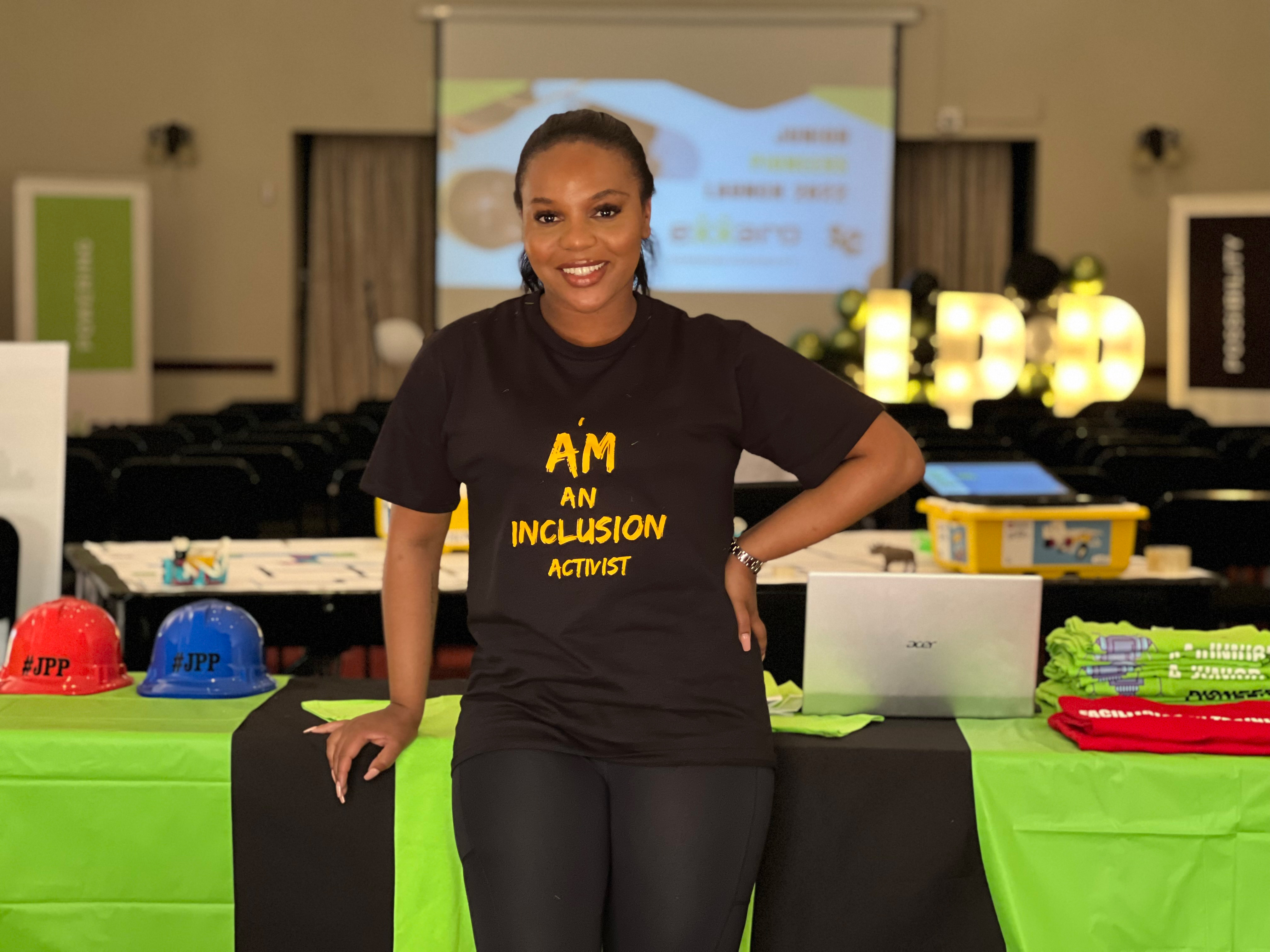Thembiso Magajana
Founder and Chairwoman, Social Coding
Fellow project website: www.socialcodingsa.com
Thembiso is transforming rural education to prepare young people for a dynamic and changing world, by training students to become part of the digital workforce. Rural high school students are encouraged to pursue STEM disciplines and trained in computer literacy and coding. By integrating cutting-edge instruction and technology, she is also helping reform schools, train teachers, identify new markets and engage businesses in investing in the future of their workforce.
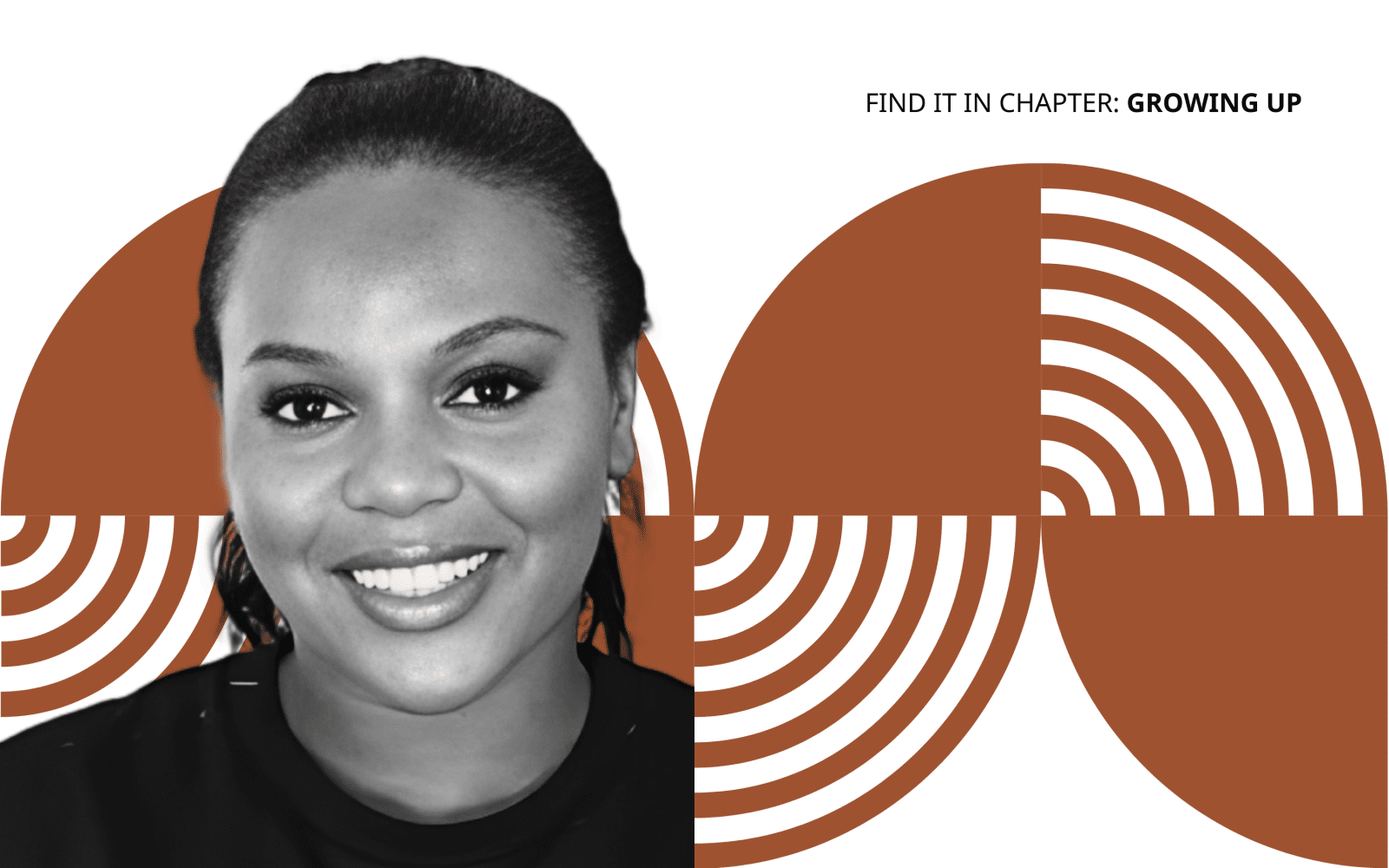
THE NEW IDEA
Social Coding is the world’s first public education reform program for the modern economy that increasingly requires fluency in technology and Artificial Intelligence. Social Coding trains and advocates for rural youth in South Africa, ensuring that they have access to technology and instruction in coding and computer literacy, in collaboration with local schools and communities. The four-year program for students in grades 8 through 12 provides young people with foundational skills in the years before they need to make key orientation choices for their studies. Students participate in six hours of weekly training in coding and computer skills, while strengthening their abilities in problem-solving and creative thinking. Busi- nesses finance the program, as an investment in their future digital workforce.
Thembiso’s approach complements other efforts to improve rural schools through interventions designed to benefit the whole school community. Social Coding introduces high-speed internet and laptops, which are shared by all. Classes run on weekends, but the program provides specialized support and resources to weekday teachers.
Government rural school improvement programs rarely deliver, often for lack of financing. Social Coding turns these failures into opportunities. For example, in early 2019 the South African government announced a plan to introduce robotics and coding into schools, but because the schools were responsible, and unable, to finance this, the program failed. Social Coding showed schools how to tap businesses and employers for financial support and create a pathway for students to enter the workforce after graduation.
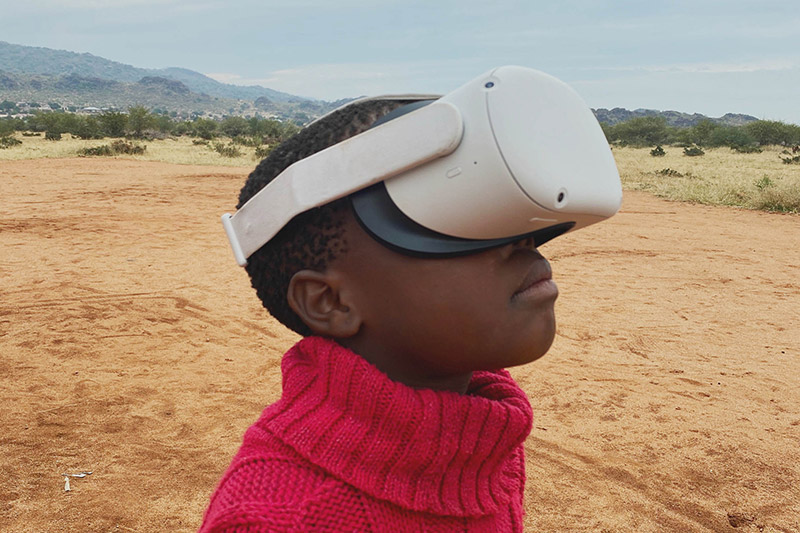
In the last six years, Social Coding has trained over 5,000 beneficiaries in 45 schools. The Social Coding model solves a daunting set of structural challenges in rural African education and is now ready to be expanded rapidly through its technology delivery platform across more than 5,000 South African schools.
THE PROBLEM
South Africa has one of the highest rates of youth unemployment in the world (43 percent of those aged 25 to 34). The education system continues to be dogged by stark inequalities and chronic underperformance that has left many students without the necessary skills to participate in the economy. Many rural schools and the communities continue to live with the consequences of the political and economic decisions made during the apartheid era, when black education was expressly designed to ensure that blacks remained manual laborers. According to recent research from Amnesty International, the result of this historical inequity is that in South Africa a child’s experience of education still very much depends on where they are born, how wealthy they are, and the color of their skin.
Young people need access to education that prepares them for success in a global world of work that is more connected than ever. The World Economic Forum observed that the Fourth Industrial Revolution (4IR) will pave the way for new types of jobs, especially in the fields of science, technology, engineering, data analysis, computer science and the social sciences. In this context, there is need to adapt the education system to one that adequately equips students with the 4IR relevant communication, thinking, and mathematical skills. Existing vocationally-oriented education interventions for young people – inside and outside public education – tend to be short-term and technically focused, like coding camps or basic computer curricula, while neglecting the generative changemaker mindset and related competencies needed to create and sustain livelihoods in rural Africa – conscious empathy, sophisticated teamwork, and shared leadership.
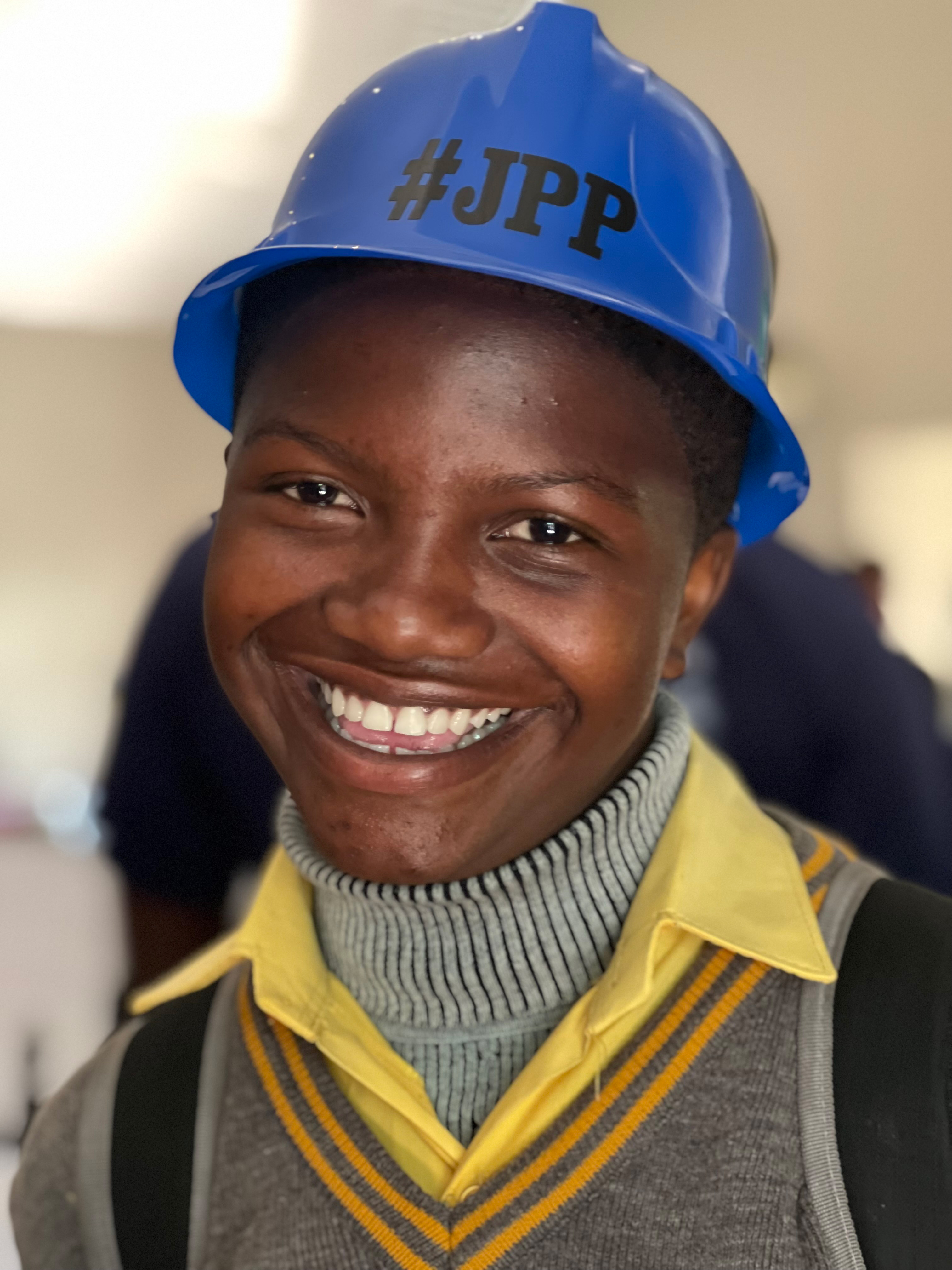
The South African Department of Education recognizes the need to integrate technical instruction and has man-dated the introduction of subjects such as coding, robotics, and computer science into the classroom. But it has not provided the financing for it. Curricula have been produced to teach these subjects but not the equipment, training, nor the dedicated salaries for the teachers. Rural schools are usually severely under-resourced and understaffed, with rural teachers lacking the confidence to teach these subjects due to poor training. Urban schools also have their challenges, but they are more able than rural schools to introduce science and technology courses. This results in a situation where many rural schools are unable to teach skills that are critical for the future of work. As Internet access and adoption spreads in town and townships, the urban-rural digital skills gap will increase if nothing is done.
"Adapting swiftly to remote learning, we bridged the educational gap and provided vital opportunities to students regardless of their location. Witnessing their growth and success fills me with pride, reinforcing the significance of our mission.”
Currently, significant government and corporate resources are being invested in providing broadband connectivity in rural communities; however, research shows that internet connectivity in rural communities as a solution on its own is not enough. Programs and initiatives that would truly bring about sustainable change need to provide both hardware and software, meaning the training and incentives for adoption.
The lack of digital skills and access to training limits youth employment opportunities, as increasingly most recruitment happens online. High data costs, the large price tag of devices needed to connect to the internet, and the lack of infrastructure investment in rural areas (including the electric grid) disadvantage rural students further.
THE STRATEGY
Thembiso’s model simultaneously addresses all these problems, fundamentally changing the way that rural communities access and adopt digital education. The entry point is training programs and the culmination point is trainees being recruited to employment by businesses as part of their investment in and adoption of AI.
The interventions and approach meet a felt need by rural schools for students to pursue math or science subjects. Social Coding’s baseline studies showed that mathematics uptake (those students who elected to pursue higher math curriculum at high school) was only 2 percent in the schools they work in. The students’ apathy towards math and science is typically not due to the lack of intellectual capacity but more a consequence of limited materials and inadequate teacher-to-student ratios. Compounding all this is the failure to communicate the relevance of these subjects to students – missing the opportunity to tap into students’ deep interest in becoming employable.
Thembiso’s first school readiness criterion is an interest in the school leadership to tackle the rural handicap. Social Coding’s team engages the school principal and the school’s governing body to show how the intervention works, from small first steps to becoming a year-round educational initiative that is conducted each Saturday (and occasionally after school), with students from the school participating for six hours each week. The total number of sessions over four years is 986.
As part of the effort to win over leaders and teachers, Social Coding offers training to the teachers on basic computer literacy and online classroom tools, such as Google Classroom and Zoom. Teachers are thus co-opted into the program by nominating the students and then providing support to them in their regular school hours. As the students progress through the program, so do the teachers.
To achieve a 20 percent target for South Africa’s students entering STEM subjects, Thembiso realized that Social Coding should pursue earlier interventions, as the students start high school. As a result, programs cluster students into three sequential stages, starting with the Junior Pioneers for grades 8-9. The Junior Pioneer programs introduces young students to STEM subjects before they are required to choose their specialist subjects in grade 10. The weekly Social Coding workshops enable grade 8 and 9 students from rural communities to develop STEM skills through computer familiarization, coding, and robotics skills.
An important component to Social Coding’s work is to instill self-confidence and conscious empathy for these disenfranchised young people. These “soft skills” perpetuate a far deeper mindset shift and understanding of one’s own capabilities than a simple coding curriculum could. Students work in pairs and come to understand how their gender, learning styles, social skills, and interests determine how they “show up” to their partner. Thembiso has created the categories of “Drivers” and “Navigators” to account for different styles of learning and teamwork, with the goal of reinforcing each child’s sense of their own abilities. Each student also develops their own values statement, which are posted in classrooms and become living documents that the students update as they observe how they can change over the course of their program.
Next Grad (covering grades 10-12) prepares young people for university or direct entry to the workforce. Students are introduced to advanced technical concepts such as systems and network technologies. Social Coding also compensates for the near-total absence of lab classrooms or equipment in rural schools by using virtual reality simulations of lab experiments. Next Grads are also exposed to social experiments in these virtual reality lessons to further develop their empathy, e.g., simulations that expose young boys to the reality of harassment that women face daily, as well as programs that give guided virtual tours about the history of discrimination. At this stage, Social Coding also facilitates competitive hackathons for their students to apply their knowledge and learn how community businesses are financing and supporting their education.
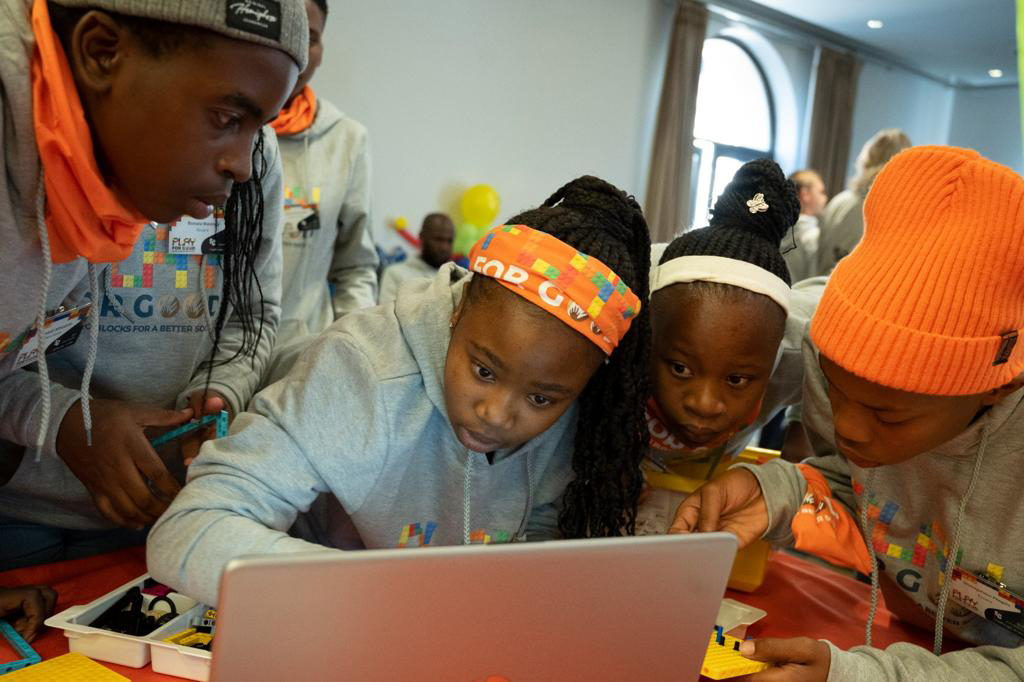
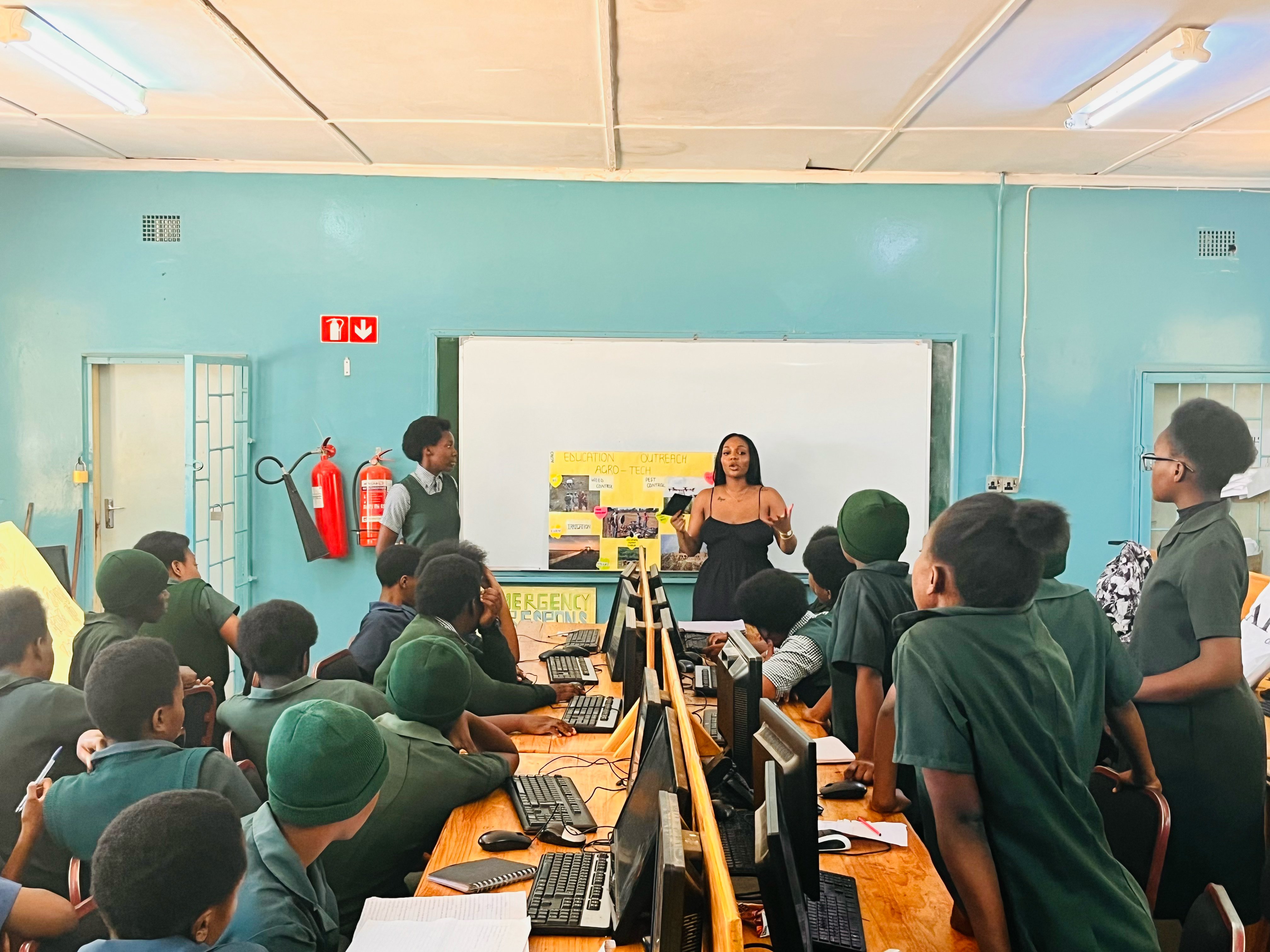
Photo Credit: Thembiso Magajana
The third element of Social Coding’s program is Untapped. This is a critical piece of Thembiso’s model, to ensure direct pathways for employment promised after graduation have been accredited by the South African government agency for vocational training, the Sector Education and Training Authority (SETA). This final element legitimizes Social Coding’s work and reassures employers that the program meets every standard.
Social Coding then recruits and trains its program alumni to become “accredited facilitators” of computer technology training. The accredited training is delivered by Merchants, a major South African and global technology and training firm, and the course fees are highly subsidized by SETA. Accredited Social Coding alumni then teach students in the Junior Pioneers program and cultivate a strong talent pipeline for Merchants and other technology firms.
Social Coding monitors its impact on young people via the percentage increase of students choosing STEM subjects in high school. Between 2018 and 2021, the average percentage of students enrolling in advanced math and science subjects across all the schools they work with was just 14 percent, a percentage that has seen a steady increase every year from a baseline of 2 percent.
"It’s less about building these great start-ups and more about giving [rural students]the tools that they can use to change their lives."
Lenovo StoryHub
Since 2016, Social Coding has served almost 5,900 students across 45 schools. In order to reach 3,000 schools by 2035, Thembiso is identifying partner schools to become district hubs where she will launch Pioneer Centers. These centers will serve multiple schools in the district and scale Social Coding across all rural schools. Pioneer Centers are equipped with modern technologies for technical education, including the use of virtual reality (VR) for remote learning. A corporate partner will then adopt a Pioneer Center and provide financial and branding support to attract more students. The rollout plan is scalable and will ensure consistent learning experiences and benefit for the community.
Thembiso has developed a range of creative partnerships with corporations such as Inclusion Champions, where corporations can contribute through financial or non-financial resources. She currently partners with Merchants and ABSA Bank to receive their depreciated laptops as part of the laptop donation program. She also partners with Facebook through VR for Good to support the Virtual Reality components of Social Coding’s program.
"By embracing cutting-edge technologies like virtual reality, Magajana ensures that the education offered by her organization remains relevant and equips students for the advanced digital age."
Soweto Life
Social Coding is piloting a new business model that hires alumni of Social Coding who do not pursue tertiary education to provide data annotation services using the skills they learn in Social Coding. According to Grandview research, the global data annotation-tools market of 805.6 million USD in 2022 is expected to reach 4.75 billion USD by 2030. Banking technology, telecommunications-based technology, and all AI-based products and services rely on large amounts of high-quality labelled data for training, tuning, and evaluating machine learning algorithms. Thembiso is encouraging large technology companies to source date annotation services from rural communities of Social Coding alumni.
To support its rollout in 5,000 new schools across rural South Africa, Social Coding is collaborating with The Southern Centre for Inequality Studies (SCIS), based at the University of Witwatersrand in Johannesburg to collect data on the impact of Social Coding and to further understand the inequality dynamics fueled by unequal access to technology. Thembiso is also advocating for the adoption of the Social Coding curriculum across all public schools to ensure students are more prepared for the world of work and tertiary education.
THE PERSON
Thembiso’s passion for contributing to the development of rural communities was sparked in her early childhood when she moved from South Africa to attend a boarding school in rural Zambia. As a teenager, she started support groups for young girls her age and would later start her own non-profit organization while at university.
While working in investment banking at Goldman Sachs, Thembiso took an interest in teaching her 6-year-old niece coding on the weekends to help her achieve her dream of becoming an innovator in the technology space just like Steve Jobs. Dismayed by how few black women entered the tech sector, Thembiso sought to create safe place for her niece and other young girls to nurture their interest in technology and entrepreneurship.
Influenced by her mother’s teaching that ‘Your dream is not a true dream until it is the dream of the community,’ her deep Christian faith, and a growing restlessness to address tech disparities in society, Thembiso left her job at Goldman Sachs to start Social Coding and engaged Tshiamo Shilowa, a data scientist specialized in AI, as a partner. In 2016, the initial idea behind Social Coding was to focus on girls but the more she understood the context in which rural children live, Thembiso realized it would be more meaningful to ensure the program was inclusive of both boys and girls in rural communities.
Thembiso is an award-winning social entrepreneur, a recipient of the 50 Most Inspiring Women in Tech Award and the Margaret Hirsch Heroine Award. She is also a World Economic Forum Global Shaper, a TEDx Speaker, a Spark International Alumnus, and was recognized as one of South Africa’s most influential youth in 2020.
